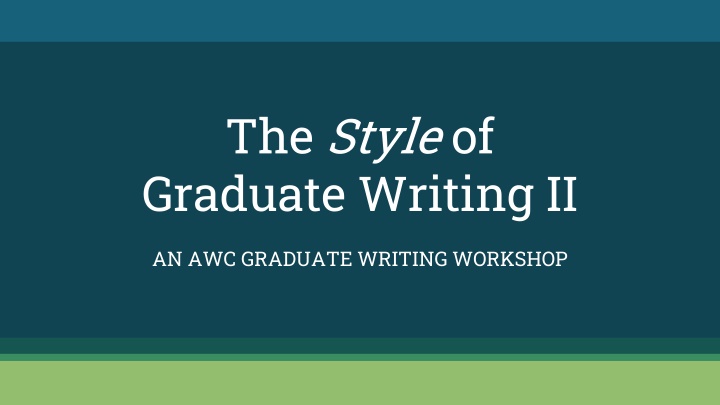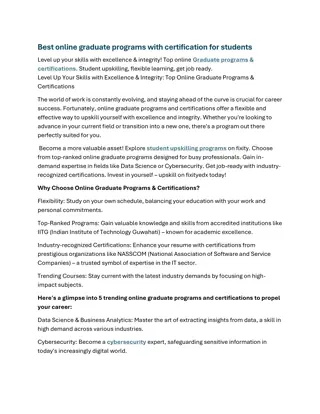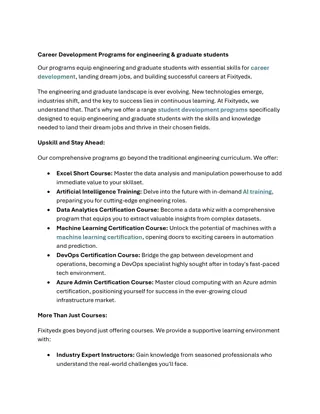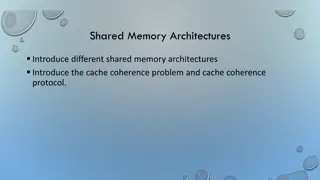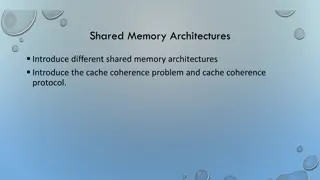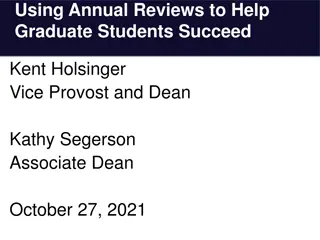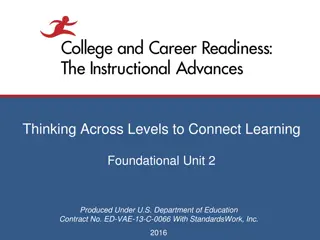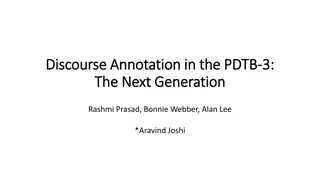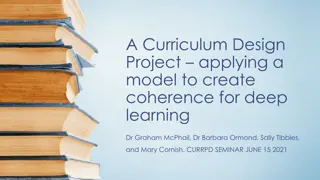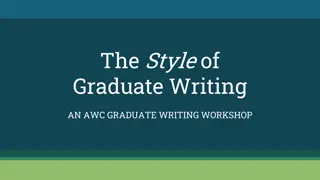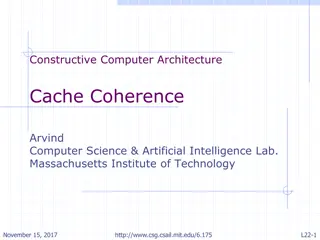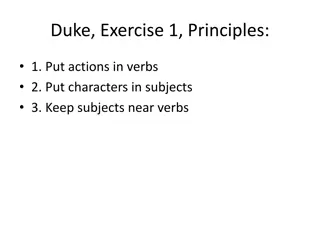Enhancing Coherence in Graduate Writing
Writing with coherence is essential for effective communication in graduate-level writing. Coherence, also known as flow, helps connect ideas logically within a sentence and paragraph. By structuring sentences to present old information before new information, writers can improve readability and clarity. Techniques such as starting sentences with simple words, limiting ideas per sentence, and using transitional phrases contribute to achieving coherence in writing.
Download Presentation

Please find below an Image/Link to download the presentation.
The content on the website is provided AS IS for your information and personal use only. It may not be sold, licensed, or shared on other websites without obtaining consent from the author.If you encounter any issues during the download, it is possible that the publisher has removed the file from their server.
You are allowed to download the files provided on this website for personal or commercial use, subject to the condition that they are used lawfully. All files are the property of their respective owners.
The content on the website is provided AS IS for your information and personal use only. It may not be sold, licensed, or shared on other websites without obtaining consent from the author.
E N D
Presentation Transcript
The Style of Graduate Writing II AN AWC GRADUATE WRITING WORKSHOP
Welcome! My name is Brooke Boling My name is Brooke Boling I am the Graduate Assistant for the AWC. You can reach me at bolingbe@ucmail.uc.edu 2
Style of Graduate Writing I vs Style of Graduate Writing II Style of Graduate Writing I Style of Graduate Writing II Coherence Thesis statements Sentence structure & modifiers Emphasis Consistent constructions Precision Transitional phrases Word choice Parallelism Active/Passive voice 3
1 Coherence Moving from old to new information Moving from old to new information 4
Overview In the context of writing studies, coherence refers to the logical bridge between ideas in a sentence. Coherence is sometimes called flow. It is important because a coherent statement is easier for your reader to follow. Coherent statements are built by presenting old or familiar information before new information. If you ve ever puzzled over a sentence or a paragraph because it didn t flow, it was probably a coherence issue. 5
Overview Focusing on coherence occurs with revision. Begin sentences with short, simple words and phrases. These phrases should communicate information that appeared in previous sentences, or build on knowledge that you share with your reader. Within a paragraph, keep your topics, or main points, direct and reasonably consistent. 6
Overview Limit yourself to one or two ideas per sentence, especially when presenting complex ideas. Remember that simple sentences enhance your writing. Start with familiar information to orient your audience, then proceed to the new information. Train yourself to recognize coherence when reading. Pay attention to how writers shift from thought to thought. If you re unsure if a paragraph is coherent, here are two techniques to check. 7
Color-Coding Technique The basis of our American democracy equal opportunity for all is being threatened by college costs that have been rising for the last several years. Increases in family income have been significantly outpaced by increases in tuition at our collects and universities during that period. Only the children of the wealthiest families in our society will be able to afford a college education if this trend continues. Knowledge and intellectual skills, in addition to wealth, will divide us as a people, when that happens. Equal opportunity and the egailitarian basis of our democratic society could be eroded by such a divide. In the last several years, college costs have been rising so fast that they are now threatening the basis for our American democracy equal opportunity for all. During that period, tuition has significantly outpaced increases in family income. If this trend continues, a college education will soon be affordable only by the children of the wealthiest families in our society. When that happens, we will be divided as a people not only by wealth, but by knowledge an intellectual skills. Such a divide will erode equal opportunity and the egalitarian basis of our democratic society. Highlight topics in different colors, and make sure sentence endings and beginnings go together. 8
Diagnosis, Analysis, Revision Diagnosis Diagnosis Underline the first few words of every sentence in a paragraph, ignoring short introductory phrases such as "In the beginning," or "For the most part." If you can, underline the first few words of every clause. (Remember that a clause has a subject and verb) 9
Diagnosis, Analysis, Revision Analysis Analysis Read your underlined words. Is there a consistent set of related topics? Will your reader see these connections among the topics? Imagine that the passage has a title. The words in the title should identify what should be the topics of most of the sentences. Decide what you will focus on in each paragraph. 10
Diagnosis, Analysis, Revision Revision Revision In most sentences, make your topics subjects that do the action in the sentences. Move your topics to the beginning of your sentences. Avoid hiding your topic behind long introductory phrases or clauses. 11
Sample Passage Topics are crucial for readers because readers depend on topics to focus their attention on particular ideas toward the beginning of sentences. Topics tell readers what a whole passage is "about." If readers feel that a sequence of topics is coherent, then they will feel they are moving through a paragraph from a cumulatively coherent point of view. But if throughout the paragraph readers feel that its topics shift randomly, then they have to begin each sentence out of context, from no coherent point of view. When that happens, readers feel dislocated, disoriented, and out of focus. 12
Sample Passage Topics are crucial Topics are crucial for readers because readers depend on on topics topics to focus their attention on particular ideas toward the beginning of sentences. Topics tell readers Topics tell readers what a whole passage is "about." If readers feel that readers feel that a sequence of topics is coherent, then they will feel they will feel they are moving through a paragraph from a cumulatively coherent point of view. But if throughout the paragraph readers feel that topics shift randomly, then they they have to out of context, from no coherent point of view. When that happens, readers readers feel dislocated feel dislocated, disoriented, and out of focus. readers depend readers feel that its have to begin begin each sentence 13
Sample Passage Read your underlined words. Is there a consistent set of related topics? Will your reader see these connections among the topics? Imagine that the passage has a title. The words in the title should identify what should be the topics of most of the sentences. Decide what you will focus on in each paragraph. Topics are crucial Topics are crucial for readers because readers depend on readers depend on topics their attention on particular ideas toward the beginning of sentences. Topics tell readers readers what a whole passage is "about." If readers feel that readers feel that a sequence of topics is coherent, then they will feel they will feel they are moving through a paragraph from a cumulatively coherent point of view. But if throughout the paragraph readers feel that that its topics shift randomly, then they they have to have to begin begin each sentence out of context, from no coherent point of view. When that happens, readers readers feel dislocated disoriented, and out of focus. topics to focus Topics tell readers feel feel dislocated, 14
Sample Passage Topics are crucial for readers. Topics tell readers what a whole passage is "about." Readers depend on topics to focus their attention on particular ideas toward the beginning of sentences. If readers feel that a sequence of topics is coherent, then they will feel they are moving through a paragraph from a cumulatively coherent point of view. But if throughout the paragraph readers feel that its topics shift randomly, then they have to begin each sentence out of context, from no coherent point of view. When that happens, readers feel dislocated, disoriented, and out of focus. 15
Questions for Revision Do your sentences "hang together"? Readers should be able to move easily from one sentence to the next; each sentence should work with the one before and after it. Does the sentence begin with information that s familiar to the reader? Readers will be familiar with your information if it has already been touched upon in the previous sentence. Does the sentence end with new information for the reader? Can your reader quickly identify the topic of each paragraph? 16
Tips for Revision 1. Highlight topics in different colors, and make sure sentence endings and beginnings go together. 2.Think about the gradual movement from idea to idea as a tunnel you are guiding your reader through. 3.Look for examples of coherence when you are reading. 4. Think about coherence alongside emphasis: your structure should put your most important information where the reader will recognize its significance. 5. Try giving yourself a few days between writing and revising to get a fresh look. 17
2 Emphasis "If you begin a sentence well, the end will "If you begin a sentence well, the end will almost take care of itself." almost take care of itself." - -Joseph Williams Williams Joseph 18
Overview Emphasis works together with coherence; coherence focuses on sentences working well together, while emphasis focuses on the order of words/ideas within the sentence When revising for emphasis, focus on how your sentences end and consider restructuring with a subordinate clause 19
Examples Weak: Weak: The data that are offered to establish the existence of ESP do not make believers of us for the most part. Better: Better: For the most part, the data that are offered to establish the existence of ESP do not make believers of us. Weak: Weak: Sociobiologists are making the provocative claim that our genes largely determine our social behavior in the way we act in situations we find around us every day. Better: Better: Sociobiologists are making the provocative claim that our genes largely determine our social behavior. 20
Exercise No one can explain why that first primeval superatom exploded and thereby created the universe in a few words. Overbuilding of suburban housing developments has led to the existence of extensive and widespread flooding and economic disaster in some parts of our country in recent years, it now seems clear. 21
Arranging Sentences for Emphasis Tell readers something important is coming by using words and phrases like especially, particularly, crucially, most importantly, and above all. Repeat key words Vary sentences by using patterns and breaking established patterns Put words you wish to emphasize near the beginnings and endings of sentences 22
Arranging Sentences for Emphasis Add a short sentence after a long sentence or a sequence of long sentences Vary sentences by using a question after a series of statements The final position in the sentence carries the most weight, so place subordinate clauses before main clauses to give maximal emphasis to the main clause 23
Tips & Resources 1. Check out Purdue OWL links in the final slide and download sample exercises online. 2.Think of emphasis as being like a camera angle watch out for moments when your focus is blurry or on the wrong object. 3.Write down sentences you think are exceptional. They are probably using stylistic elements like emphasis to their advantage. 4. Think about coherence alongside emphasis: your structure should put your most important information where the reader will recognize its significance. 24
3 Precision To make your writing as precise as possible, use effective, concise, and strong language 25
Concision Replace several vague words with one strong word: The politician talked about several of the merits of about several of the merits of after-school programs in his speech Suzie believed but could not confirm believed but could not confirm that Billy had feelings of affection for for her. Fix by replacing wordy descriptions with a specific word: The politician touted touted after-school programs in his speech. Suzie assumed assumed that Billy adored adored her. had feelings of affection Tip: Brainstorming or searching a thesaurus can lead to the word best suited for a specific instance. Notice that these examples convey more as they drop in word count. 26
Concision Interrogate individual words in sentences. Check every word to make sure that it is providing something important and unique to a sentence. The teacher demonstrated some of the various ways and methods for cutting words from my essay that I had written for class. The teacher demonstrated methods for cutting words from my essay. Tip: You may not have time to do this with every sentence when revising for class. Focus on sentences that you or someone else has identified as wordy or unclear. 27
Concision Combine sentences: Ludwig's castles are an astounding marriage of beauty and madness. By his death, he had commissioned three castles three castles. Ludwig's three castles three castles are an astounding marriage of beauty and madness. The supposed crash of a UFO in Roswell, New Mexico aroused interest in extraterrestrial life. This crash is rumored to have occurred in 1947 The supposed 1947 1947 crash of a UFO in Roswell, New Mexico aroused interest in extraterrestrial life. 1947. 28
Eliminate Words Eliminate words that explain the obvious or provide excessive details. Wordy: Wordy: I received your inquiry that you wrote about tennis rackets yesterday, and read it thoroughly. Precise: Precise: I received your inquiry about tennis rackets yesterday. Wordy: Wordy: It goes without saying that we are acquainted with your policy on filing tax returns, and we have every intention of complying with the regulations that you have mentioned. Precise: Precise: We intend to comply with the tax-return regulations that you have mentioned. 29
Eliminate Words Eliminate unnecessary determiners and modifiers. Wordy: Wordy: Any particular type of dessert is fine with me. Precise: Precise: Any dessert is fine with me. Wordy: Wordy: Balancing the budget by Friday is an impossibility without some kind of extra help. Precise: Precise: Balancing the budget by Friday is impossible without extra help. You can often remove words like kind of, sort of, type of, really, basically, for all intents and purposes, definitely, actually, generally, individual, specific 30
Eliminate Words Remove repetitive wording. Watch for phrases or longer passages that repeat words with similar meanings. Delete redundant pairs and categories. Wordy: Wordy: The supply manager considered the correcting typewriter an unneeded luxury. Precise: Precise: The supply manager considered the correcting typewriter a luxury. Redundant pairs: past memories, basic fundamentals, true facts, future plans, end result, final outcome Redundant categories: large in size, heavy in weight, period in time, round in shape 31
Change Phrases Change phrases into single-words and adjectives. Wordy: The employee with ambition Precise: The ambitious employee Wordy: The department showing the best performance Precise: The best-performing department Change unnecessary that, who, and which clauses into phrases Wordy: Wordy: The report, which was released recently Precise: Precise: The recently released report Wordy: Wordy: All applicants who are interested in the job must... Precise: Precise: All job applicants must... 32
Common Errors to Avoid Overusing expletives at the start of sentences. Expletives are phrases of the form it + be-verb or there + be-verb. Wordy: Wordy: It is the governor who signs or vetoes bills. Precise: Precise: The governor signs or vetoes bills. Wordy: Wordy: There are four rules that should be observed: ... Precise: Precise: Four rules should be observed:... 33
Common Errors to Avoid Nominalization: noun forms of verbs Wordy: Wordy: The function of this department is the collection of accounts. Precise: Precise: This department collects accounts. Wordy: Wordy: The current focus of the medical profession is disease prevention. Precise: Precise: The medical profession currently focuses on disease prevention. 34
Common Errors to Avoid Unnecessary infinitive phrases Wordy: Wordy: The duty of a clerk is to check to record to record it. Precise: Precise: A clerk checks checks and records to check all incoming mail and records all incoming mail. Wordy: Wordy: A shortage of tellers at our office on Friday has caused customers to become to become dissatisfied with service. Precise: Precise: A teller shortage at our office on Friday has caused customer dissatisfaction. 35
Common Errors to Avoid Indirect/wandering language or figures of speech because, since, because, since, why: why: about: about: when: when: as regards, in reference to, with regard to, concerning the matter of, where X is concerned on the occasion of, in a situation in which, under circumstances in which the reason for, for the reason that, owing/due to the fact that, in light of the fact that, considering the fact that, on the grounds that, this is why must, should: must, should: may, might, could: may, might, could: can: can: it is crucial that, it is necessary that, there is a need/necessity for, it is important that, cannot be avoided it is possible that, there is a chance that, it could happen that, the possibility exists for is able to, has the opportunity to, has the capacity for, has the ability to 36
Wordiness Common problems: Excessive qualifiers (e.g. really, mostly, very, etc.) Redundant words Excessive prepositions (e.g. of, to, at, etc.) Wordy stock phrases (e.g. It is crucial that ) 37
Thank you! Langsam 401N uc.edu/awc 513.556.3912 Appointments available Monday Thursday: 9am 8pm Friday: 9am- 5pm Drop-in available Monday Friday: 10am 4pm 38
Works Cited Williams, J.M. (2007). Style: Lessons in clarity and grace (9th ed.). New York: Pearson Longman. Purdue OWL https://owl.purdue.edu/owl/general_writing/academic_writing/conciseness/ avoid_common_pitfalls.html https://owl.purdue.edu/owl/english_as_a_second_language/esl_students/no minalizations_and_subject_position.html https://owl.purdue.edu/owl/general_writing/academic_writing/adding_emph asis/choice_and_arrangement.html 39
